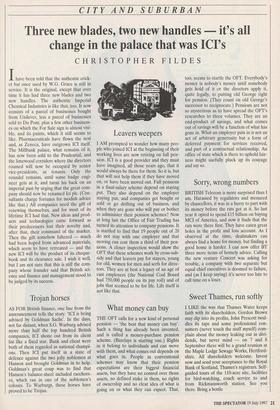What money can buy
THE OFT calls for a new kind of personal pension — 'the best that money can buy'. Such a thing has already been invented, and is called a money-purchase pension scheme. (Barclays is starting one.) Rights in it belong to individuals and can move with them, and what comes out depends on what goes in. People in conventional schemes may know that their pension expectations are their biggest financial assets, but they have no control over those assets, no defined stake in them, no rights of ownership and no clear idea of what is going on or what they can expect. That, too, seems to startle the OFT. Everybody's money is nobody's money until somebody gets hold of it or the directors apply it, quite legally, to putting old George right for pension. (They count on old George's successor to reciprocate.) Pensions are not so mysterious as to have spread the OFT's researches to three volumes. They are an end-product of savings, and what comes out of savings will be a function of what has gone in. What an employer puts in is not an act of arbitrary generosity but a form of deferred payment for services received, and part of a contractual relationship. An office of state which is there to uphold fair- ness might usefully pluck up its courage and say so.


























































 Previous page
Previous page